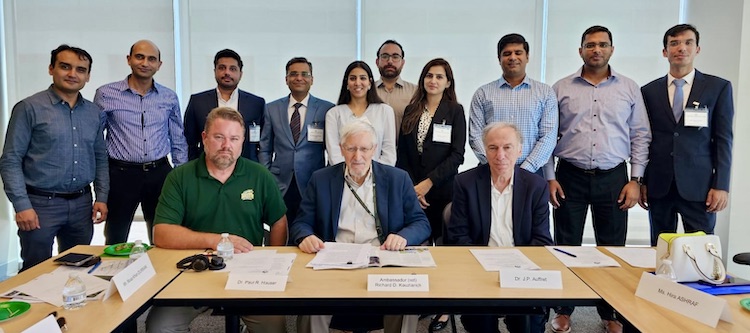In This Story
According to the World Bank, some 40% of Pakistanis—about 96 million people—do not have access to dependable electricity, and the demand for power continues to grow. The nation’s declining natural gas supply, lack of investment in new power generation, and corporate and political instability in the energy sector present a continuing, and extremely expensive, existential crisis.

In late July, George Mason University’s Center for Energy Science Policy (CESP) hosted 10 national and provincial energy and science officials from Pakistan in a meeting sponsored by the U.S. State Department’s International Visitor Leadership Program. The officials’ mission: To learn about U.S. renewable energy and climate policy, in the hopes of improving energy infrastructure in their home country.
During the two-hour meeting held at Mason Square, the officials met with CESP codirectors Ambassador (ret.) and Schar School Distinguished Visiting Professor Richard Kauzlarich, director of research partnerships for the School of Business J.P. Auffret, and College of Science professor Paul Houser.
The request to host the delegation originated with the Mississippi Consortium for International Development, a Washington, D.C.-based nonprofit that works with the State Department in building international partnerships.
The center is part of the Schar School of Policy and Government, and given Mason’s location and the reputation of the CESP for energy policy studies, “in a sense, we were the natural academic institution in the region to host these officials,” Kauzlarich said.
The CESP multidisciplinary team—representing the Schar School, the School of Business, College of Science, College of Engineering and Computing, and Mason’s Institute for a Sustainable Earth, provided a comprehensive picture of Mason’s capabilities. The CESP codirectors detailed Mason's distinctive experience with public–private partnerships in energy infrastructure.
The varied backgrounds of the CESP participants “enabled us to explain what George Mason University is doing as far as research and teaching in energy and water infrastructure activities, including energy-efficiency projects on the Mason campuses,” said Kauzlarich. “We also highlighted efforts at public–private partnerships in renewable energy.”
The Pakistani representatives were impressive, he added, and provided an overview of Pakistan's renewable energy opportunities and challenges and Pakistan's needs. That may lead to expanded cooperation opportunities for Mason in Pakistan.”
In short, “we established good contacts that may prove helpful in strengthening the Mason’s research efforts in climate and renewable energy,” said Kauzlarich.
